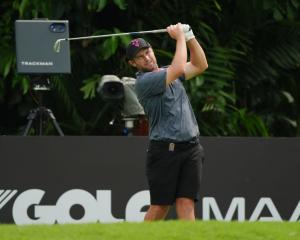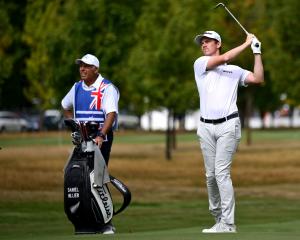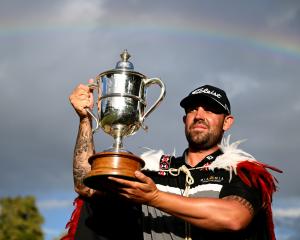Ask any husband: it's a perilous business when they have memory lapses about their wedding anniversaries.
But Jim Clelland will never forget his again.
That's because almost two years ago he spent that special date, August 7, on the operating table at Waikato Hospital having his lower right leg amputated.
For someone who has made a living from playing and teaching golf since he turned professional 33 years ago, the loss of a limb could have been a devastating, career-ending blow.
But Clelland (67), the national events manager for the PGA of New Zealand since 2005, has turned this major setback into a positive challenge, one which he has already conquered by continuing to play the game he loves.
"When I started back, the first five cards I scored had me on a 15.9 handicap.
"But these days I'm back to a 1.9," he said.
Playing golf to such a competitive level again was one of the 10 goals he set himself during his recovery from the operation 16 months ago, like being able to play nine and then 18 holes, in a buggy and then walking, and other simple things such as being able to mow his own lawns again.
Clelland's ordeal began when he fell off a balcony of his Taupo home in November, 2007 while moving furniture, shattering the lower leg and wrecking the ankle joint as well.
For nine months doctors and specialists did their best to save the leg but the bones were so badly damaged they would not knit, forcing Clelland to face the unpalatable truth one fateful day at Waikato Hospital.
When the three specialists told him amputation was probably the best option and they wanted to do it straight away, Clelland was shocked.
"I said to them, 'I tell you what; I'll go home, get drunk and give you a call on Monday with my decision'," he recalled.
But faced with the certain prospect of constant pain and arthritis for the rest of his life, Clelland agreed to the operation, then learned surgeons had him booked in for the amputation on his wedding anniversary (he's been married to Helen for 43 years).
"As you can imagine, that was an incredibly emotional day," he said.
"But it was the right thing to do."
Once the leg had healed and an artificial limb fitted, Clelland began the slow process of learning all over again how to swing a golf club and maintain that all-important balance, boosted by the ironic observation that if you are a right-handed golfer, then it's best to lose your right leg, not the left.
It was not all smooth sailing but he persevered, heeding the advice of his artificial leg mechanic, who told him to "get your chin up, look towards the horizon and walk evenly".
In August last year, 12 months after the amputation, Clelland ticked off the ultimate goal, of returning to the professional circuit, competing in four senior tournaments in Australia.
"My goal was to break 80 and I think my best score was 74 but the most pleasing thing was not letting my playing partners know about my artificial leg and they didn't pick it, either," he said.
So, he could have been out on Millbrook's carefully manicured fairways this weekend, trying to win a share of the $180,000 prizemoney available over the three days.
But instead he's content to confine his energies to helping run the four inaugural senior tournaments that form the "southern swing", ending with the $30,000 City of Dunedin Legends Pro-Am at the Otago Golf Club next week.
Clelland, who oversees about 35 tournaments a year, recalls there was only one senior golf event in New Zealand 10 years ago but now there are eight, and he is determined the four new senior events will become permanent fixtures.
"There is room for them to get better and better and I know Dunedin is very keen to establish their event, so that's got to be good for the sport here," he said.
Incidentally, while Clelland is a northerner, he does have strong southern links through his mother, Agnes Hall, who was born at Tarras, while grandfather George Hall is buried in the Alexandra cemetery.










